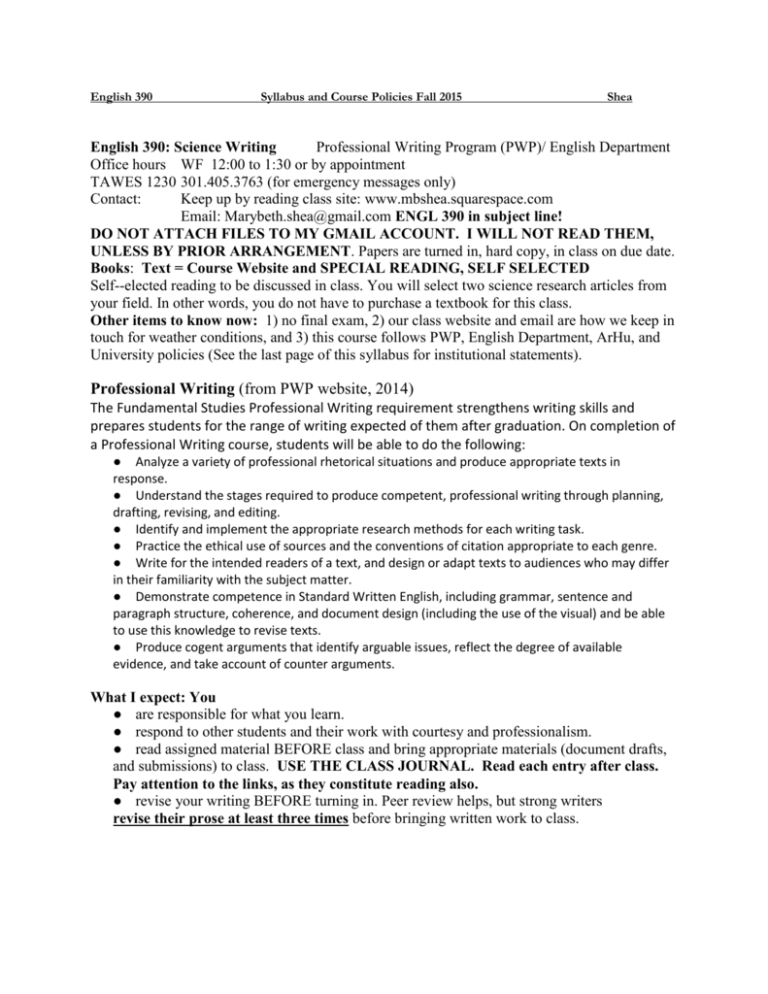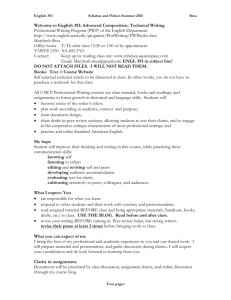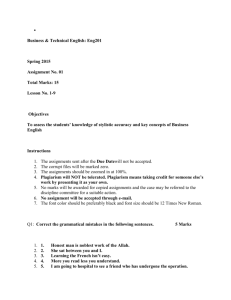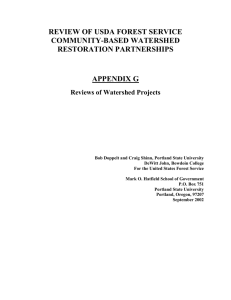English 390
advertisement

English 390 Syllabus and Course Policies Fall 2015 Shea English 390: Science Writing Professional Writing Program (PWP)/ English Department Office hours WF 12:00 to 1:30 or by appointment TAWES 1230 301.405.3763 (for emergency messages only) Contact: Keep up by reading class site: www.mbshea.squarespace.com Email: Marybeth.shea@gmail.com ENGL 390 in subject line! DO NOT ATTACH FILES TO MY GMAIL ACCOUNT. I WILL NOT READ THEM, UNLESS BY PRIOR ARRANGEMENT. Papers are turned in, hard copy, in class on due date. Books: Text = Course Website and SPECIAL READING, SELF SELECTED Self--elected reading to be discussed in class. You will select two science research articles from your field. In other words, you do not have to purchase a textbook for this class. Other items to know now: 1) no final exam, 2) our class website and email are how we keep in touch for weather conditions, and 3) this course follows PWP, English Department, ArHu, and University policies (See the last page of this syllabus for institutional statements). Professional Writing (from PWP website, 2014) The Fundamental Studies Professional Writing requirement strengthens writing skills and prepares students for the range of writing expected of them after graduation. On completion of a Professional Writing course, students will be able to do the following: ● Analyze a variety of professional rhetorical situations and produce appropriate texts in response. ● Understand the stages required to produce competent, professional writing through planning, drafting, revising, and editing. ● Identify and implement the appropriate research methods for each writing task. ● Practice the ethical use of sources and the conventions of citation appropriate to each genre. ● Write for the intended readers of a text, and design or adapt texts to audiences who may differ in their familiarity with the subject matter. ● Demonstrate competence in Standard Written English, including grammar, sentence and paragraph structure, coherence, and document design (including the use of the visual) and be able to use this knowledge to revise texts. ● Produce cogent arguments that identify arguable issues, reflect the degree of available evidence, and take account of counter arguments. What I expect: You ● are responsible for what you learn. ● respond to other students and their work with courtesy and professionalism. ● read assigned material BEFORE class and bring appropriate materials (document drafts, and submissions) to class. USE THE CLASS JOURNAL. Read each entry after class. Pay attention to the links, as they constitute reading also. ● revise your writing BEFORE turning in. Peer review helps, but strong writers revise their prose at least three times before bringing written work to class. English 390 Syllabus and Course Policies Fall 2015 Shea What you can expect of me: I bring the best of my professional and academic experience to you and our shared work. I will prepare materials and presentations, and guide discussion during classes. I will respect your contribution and do look forward to learning from you. In marking your documents, I will focus on evaluation and comments that help you improve your writing. Clarity in assignments (see Syllabus Rationale document and individual assignment sheets) Documents to be written by you will be presented by class discussion, assignment sheets, and online material posted on and linked to through the class journal/course website. Brief comments on grades: I expect to mark student documents as passing. Like the professional world, ON TIME is key. D and F marks reflect a student’s irresponsibility in responding to assignments. This means that the student is completely responsible for earning these marks. Roughly: ● C work is adequate, covering material and presentation norms, and arrives ON TIME. ● B work demonstrates increased insight and professionalism in material and presentation, and arrives ON TIME. ● A work is outstanding in material and presentation, and arrives ON TIME. I use assignment sheets – theory, tasks, and evaluation criteria – to prompt your writing. Weighting of assignments and classroom participation Course work includes small assignments and major genre pieces Participation covers attendance, in-class reflection assignments, short service learning by web curation and knowledge construction, and in-class participation I give weight to improvement as the semester progresses, demonstrated by learning (student does not make same mistakes over time!). The minimum number of pages of written text in the class total approximately 25-30, and is set by the English Department and PWP. Many students will write more. Small assignments include in-class writing exercises, mechanics quizzes, resume critiques, meeting minutes, etc. Assignment sheets will be posted on the blog. Major Assigned Documents: Assignment # Weight Appr. Week Beginning Reflection Essay Part. Executive Summary Memo 1a 1 1-2 Executive Summary Memo 1b 1 2-3 Book Review 2 1 3 MidTerm Reflection Essay Part. Definition for Two Audiences 3a, 3b 2 TBA Directions/Procedures 4 1 9 Resume/Cover 6 Pass/Fail** TBA MANDATORY PORTFOLIO REVIEW Part* 13-14 Ending Reflection Essay Part. Five Staged Final Paper Assignments5a-5e 1 10-13 Final Project: Magnus Opus 5 5 14-15 English 390 Syllabus and Course Policies Fall 2015 Shea *Part = Participation (attendance, reflection essays and notes, portfolio) 3 **Pass/Fail means you either landed an “interview” or you didn’t. This means that the final paper counts four times more than the first summary memos. Total participation is weighted at 3, reflecting a value on your presence and what you bring to our work. DETAILED COURSE SCHEDULE POSTED AFTER ADD/DROP. ALL WORK MUST BE SAVED BY YOU IN A PAPER PORTFOLIO. YOU WILL BRING THIS PORTFOLIO TO YOUR CONFERENCES AND TURN IT IN AT THE SEMESTER END. PASSING THIS CLASS IS BASED ON YOUR INTACT AND COMPLETE PORTFOLIO. Final document, Assignment 5: Magnus Opus (great works): Students will prepare a final project on a professional topic. The document will follow professional norms, including clear and robust documentation. The challenge in this assignment is to find a topic/audience/format suitable for presentation to a real client or prospective employer. Start thinking now about this opportunity to prepare a document for your professional life in a supportive workshop setting. Honesty: I presume that you have read and taken to heart the policy on academic integrity at the University of Maryland. If not, please do so immediately. In any writing course, plagiarism is a particular concern. We will discuss this topic periodically throughout the semester. Please learn about the cases of Steven Ambrose, and Doris Kearns Goodwin. That two respected scholars have stepped in this quagmire should give the student pause, as it does me, a professional writer of some years’ experience. Plagiarism in this course will result in referral to the appropriate University authorities. Expulsion from the University is a distinct possibility for any student found guilty of plagiarism. Failing a course, academic dishonesty, noted is likely. Technology poses a plagiarism problem: You must be scrupulous when cutting and pasting text from sources. I suggest NOT using this option in writing documents for this course or any course, or at any time in your writing future. Keeping notes in longhand or by photocopy is one way to avoid a plagiarism charge due to poor management of research material/notes. Plagiarism “happens.” NEVERTHELESS, you are responsible. The same Internet that tempts some students to steal intellectual property and present it as their work makes my evaluation of suspect text rather easy and robust to challenge. Software allows detection of small strings of text like phrases and sentences, larger chunks like paragraphs and visuals, and finally entire papers (such as those offered on certain shady websites targeting college students). Be warned. Be smart. Be honest. Revision and feedback: As an editor, writer, and a scientist, I am process-oriented. Revision is perhaps the strongest indicator of a writer’s growth. Seasoned writers seldom get it right the first time; they know that good writing is hard won after several passes. A and high B work reflects revision BEFORE turning in. Most assignments include time for peer review sessions. In class, you will respond to your colleagues’ writing. I will guide the peer review sessions, but as English 390 Syllabus and Course Policies Fall 2015 Shea the semester unfolds, you will develop additional tools for peer review. Critical reflection is a skill I wish to help you develop. I will comment on your assignments in a number of ways: ● Commentary on your papers as side notes, marks, etc. ● General comment in class about common lapses and common victories, including samples lifted from student writing for review and discussion. ● Referrals to writing handbook, Purdue University’s excellent Online Writing Lab (OWL) site, The UMCP Writing Center, or other tutorial venue. Attendance: I value courtesy and manners in the classroom. Please bring your best self to class each day – on time -- prepared to speak and listen. Attendance is essential for all PWP classes since we are a studio or laboratory course rather than a lecture. Please inform me in writing by email of the reason for your absence. As in professional life, notice should be given before the absence–doctor’s appointment, Nobel Prize ceremony, wedding, etc. If the absence “cannot be scheduled,” please inform me immediately afterwards. Missing more than three days of class lowers your participation grade significantly. Please ask about missed content from a colleague before writing me. Attendance contributes toward your participation grade. Since much of our time together is collaborative and workshop-based, attendance strongly correlates with performance. Show up and be counted. PWP courses simulate work (i.e. BE THERE!, see “Attendance” above.): Some of the structure of this course also prepares your for workplace writing and comportment. Class attendance is essential for understanding assignments and learning new communication skills important for the conduct of your field. Timeliness, accuracy, insight, knowledge, presentation, generosity–these are the tools of an intelligent and dedicated worker. Advancement, opportunity, and salary are all performance-based; so too are grades. Work is essentially a cooperative effort. Most written work products are jointly authored. Peer review of documents, as well as class participation, prepares you for the professional world. How PWP courses are different from most University courses: We write for non academic audiences. You will define this audience (telling me about them in an audience analysis), developing research, style, arrangement, and content for specific readers. Some students, used to writing for professors, continue the academic approach in ENGL 390. Highest marks, however, go the writers who develop this ear for audience. In short, we ● write to help others do their jobs better and make sound professional decisions; NOTE!: we ● do not write to impress or confound others, nor elevate ourselves. Closing note: I like the model of track and field: run the best race you can, giving muscle and imagination to the event. There will be marks for events over the “season” (the assignments), a significant mark on your big event (the final project) and a season review of the statistics (final grade). Do what you will with the coaching (classes, website text and discussion) and espirit de corps. I stand ready to help you improve your marks. English 390 Syllabus and Course Policies Fall 2015 Shea University policies for undergraduate instruction Students with disabilities: The University of Maryland is committed to providing appropriate accommodations for students with disabilities. Students with a documented disability should inform the instructors within the add-drop period if academic accommodations are needed. To obtain an Accommodation Letter prepared by Disability Support Service (DSS), a division of the University Counseling Center, please call 301-314-7682, e-mail dissup@umd.edu, or visit the Shoemaker Building for more information. “Terp” accommodations: NCAA athletes and traveling band members must inform me during the first two weeks of class. Students with DSS letters must also inform me within the first two weeks. Religious obligations require an email communication to me. Other situations must be presented to me by email before they occur. Absence due to religious observance will not be penalized, however, it is the student’s responsibility to notify the instructor within the first three weeks of class regarding any religious observance absence(s) for the entire semester. Illness and medical conditions: Students are expected to inform the instructor in advance of medically necessary absences, and present a self-signed note documenting the date of the missed class(es) and testifying to the need for the absence. This note must include an acknowledgement that (a) the information provided is true and correct, and (b) that the student understands that providing false information to University officials is a violation of Part 9(h) of the Code of Student Conduct. Academic accommodations for students who may experience sexual misconduct: The University of Maryland is committed to providing support and resources, including academic accommodations, for students who experience sexual or relationship violence (as defined by the University’s Sexual Misconduct Policy). To report an incident and/or obtain an academic accommodation, contact the Office of Civil Rights and Sexual Misconduct at 301-405-1142. If you wish to speak confidentially, contact Campus Advocates Respond and Educate (CARE) to Stop Violence at 301-741-3555. Disclosures made to faculty are not confidential and must be reported to the Office of Civil Rights and Sexual Misconduct. Diversity: The University of Maryland values the diversity of its student body. Along with the University, I am committed to providing a classroom atmosphere that encourages the equitable participation of all students regardless of age, disability, ethnicity, gender, national origin, race, religion, or sexual orientation. Potential devaluation of students in the classroom that can occur by reference to demeaning stereotypes of any group and/or overlooking the contributions of a particular group to the topic under discussion is inappropriate. This document is to be read in conjunction with my Syllabus Rationale (where I explain my pedagogical reasons for the assignment, the writing skills to be practiced, and the staging of each assignment). The other set of documents that support this syllabus is the assignment sheets themselves (on class website Five pages, revised fall 2015






